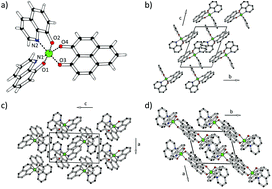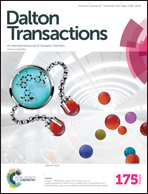Controlled manipulation of the Co–Alq3 interface by rational design of Alq3 derivatives†
Abstract
Recently, research has revealed that molecules can be used to steer the local spin properties of ferromagnetic surfaces. One possibility to manipulate ferromagnetic-metal–molecule interfaces in a controlled way is to synthesize specific, non-magnetic molecules to obtain a desired interaction with the ferromagnetic substrate. Here, we have synthesized derivatives of the well-known semiconductor Alq3 (with q = 8-hydroxyquinolinate), in which the 8-hydroxyquinolinate ligands are partially or completely replaced by similar ligands bearing O- or N-donor sets. The goal of this study was to investigate how the presence of (i) different donor atom sets and (ii) aromaticity in different conjugated π-systems influences the spin properties of the metal–molecule interface formed with a Co(100) surface. The spin-dependent metal–molecule-interface properties have been measured by spin-resolved photoemission spectroscopy, backed up by DFT calculations. Overall, our results show that, in the case of the Co–molecule interface, chemical synthesis of organic ligands leads to specific electronic properties of the interface, such as exciton formation or highly spin-polarized interface states. We find that these properties are even additive, i.e. they can be engineered into one single molecular system that incorporates all the relevant ligands.

- This article is part of the themed collection: Molecular Spintronics : The role of Coordination Chemistry

 Please wait while we load your content...
Please wait while we load your content...